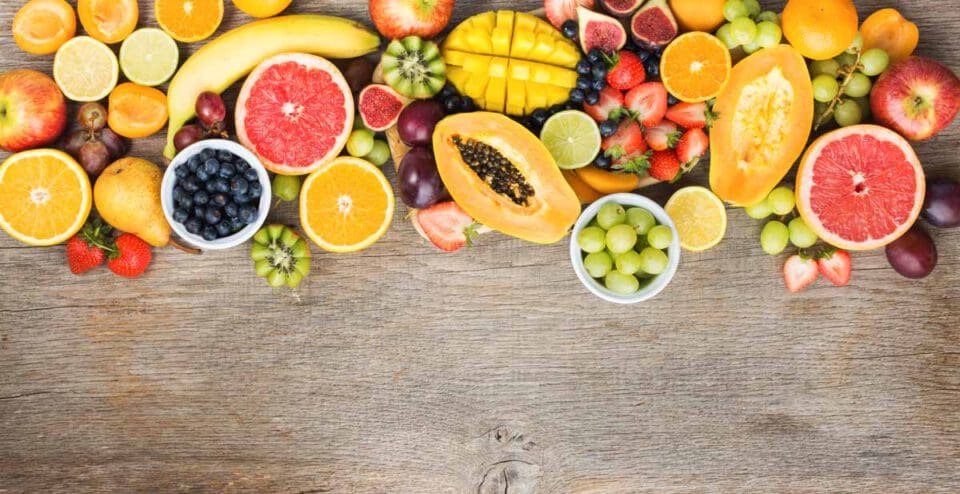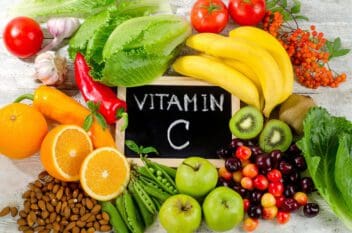How Does Your Diet Impact Eye Health & Vision?
Home /
Last Updated:
People are often looking for natural ways to improve eye health, whether it’s through dietary choices or external remedies. Those with a family history of poor vision or retinal health problems might fear that they are destined to encounter these problems at some point in their life. However, research shows that it’s not all genetics. An individual’s diet can also impact their eye health.
Table of Contents
Certain nutrients and vitamins — like omega-3 fatty acids, vitamins A and C, and zinc — can lower the risk of prevalent eye conditions, including age-related macular degeneration (AMD) and cataracts.
A diet that includes whole foods containing eye-enhancing nutrients can help to ensure an individual is getting the nutrients they need to maintain proper vision and eye health. These foods include antioxidant-rich citrus fruits, leafy greens containing phytochemicals, and oily fish that provides omega-3s.
While a healthy and nutrient-rich diet will promote eye health, eating highly processed and high-fat foods may increase the risk of eye problems. Other factors, like diabetes and dehydration, can lead to chronic vision and eye conditions.
Research Shows That a Healthy Diet Can Impact Eye Health

- A 2013 AREDS update study found that other nutrients, including lutein and zeaxanthin, are also important to eye health.
- Meta-analysis research from 2015 found a significant association between vitamin E intake and a reduced risk of age-related cataracts (ARC).
- A 2007 study, led by Professor Lois Smith of Harvard Medical School, found that omega-3 fatty acids may prevent proliferative retinopathies, a leading cause of blindness.
Which Vitamins and Nutrients May Be Beneficial for Eye Health?

According to current research and the American Optometric Association (AOA), the following vitamins and nutrients may be the most beneficial to eye health:
- Lutein and zeaxanthin: These phytochemicals were found to lower the risk of age-related macular degeneration and cataracts as well as other chronic eye diseases.
- Essential fatty acids: “Good” fats play an important role in fueling cells and optimizing central nervous system function. Omega-3 fatty acids, particularly eicosapentaenoic acid (EPA) and docosahexaenoic (DHA), are vital in vision development and maintaining proper eye and retinal function.
- Vitamin C, or ascorbic acid: In addition to lowering the risk of developing cataracts, this antioxidant can help to slow age-related macular degeneration and vision loss, especially when taken with other eye-healthy nutrients.
- Zinc: Heavily concentrated in the eye, this trace mineral helps to transport vitamin A from the liver to the retina, where it helps to produce melanin, a pigment needed to protect the eyes.
- Vitamin E: This antioxidant protects eyes from harmful free radicals — unstable molecules that damage healthy tissue.
Which Foods Are Best for Eye Health and Vision?
The best foods for eye health and vision will be those that offer the nutrients known to support eye health and function.
- Fish: Manly fish (those that have oil in their gut and body tissue) are excellent sources of omega-3 acids. Fish with ample EDA and DHA include tuna, sardines, trout, mackerel, and herring.
- Broccoli: An easy add-on to many dishes, broccoli offers vitamin C as well as lutein and zeaxanthin.
- Nuts and legumes: Some nuts are rich in omega-3s as well as vitamin E, making them a smart and easy source of eye-healthy nutrients. Healthy choices include walnuts, cashews, Brazil nuts, and lentils.
- Seeds: Many seeds, including hemp seeds and chia seeds, are also rich in omega-3 and vitamin E.
- Citrus fruits: Citrus fruits, like lemons, oranges, and grapefruit, are great sources of eye-aiding vitamin C.
- Eggs: With omega-3s, lutein, and vitamin E, protein-rich eggs are a powerhouse of eye support health. Certain varieties, including some free range and organic brands, boast having double the omega-3s of other eggs and substantially more vitamin E and lutein as well.
- Leafy greens: In addition to providing vitamin C, leafy greens like spinach and kale are high in lutein and zeaxanthin. Some research shows cooking the greens helps the body to better absorb the lutein.
- Beef: While other meats, including chicken and pork loin, contain zinc, beef offers higher levels of this vital trace mineral. Other sources of zinc include some yogurts, nuts, and beans.
You deserve clear vision. We can help.
With 135+ locations and over 2.5 million procedures performed, our board-certified eye surgeons deliver results you can trust.
Your journey to better vision starts here.

Can Certain Diets Increase the Risk of Vision Problems?
An unhealthy diet of highly processed foods that lack nutritional value may not provide an individual with enough nutrients to support optimum eye and vision health. In fact, research suggests that a high-fat diet of processed foods may increase the risk of developing age-related macular degeneration (AMD).
Other potential diet dangers to eye health include the following:
- Diet soda: A 2018 study found a substantially higher risk of proliferative diabetic retinopathy (a progressive retinal disease) among individuals who consumed more than four cans of diet soda weekly.
- Dehydration: Adequate water and hydration are essential to many aspects of health, and vision and eye care is no exception. Not drinking enough water can lead to dry, irritated, or itchy eyes.
- High sodium: Some research has shown a link between a high-sodium diet and an increased risk of cataracts.
- Diabetes: Diabetes can cause short-term and long-term blurred vision. Diabetes-related eye conditions are progressive and may get worse with time. Complications may include diabetic retinopathy, which can lead to blindness.
- Refined carbohydrates: An American Journal of Clinical Nutrition study found that those at risk of developing age-related macular degeneration may benefit from eating fewer refined carbohydrates in their diet. Diets that provide a higher glycemic index, such as those high in refined carbs, may increase the risk of AMD progression. Refined carbohydrates are highly processed grain products. The refining process often removes vitamins and nutrients as well as fiber. Examples of refined carbs include white bread, baked goods like muffins and cookies, and pasta.
You deserve clear vision. We can help.
With 135+ locations and over 2.5 million procedures performed, our board-certified eye surgeons deliver results you can trust.
Your journey to better vision starts here.
Talk to You Doctor
It’s important to talk to an optometrist before making diet changes if you want to adjust the food you eat with the hope of improving your eyesight.
Not surprisingly, healthy foods are highly recommended for good eyesight. To learn specifically which of these foods are readily available to you and which you may have to supplement, you may need a doctor’s opinion.
You should also consult your doctor before removing foods from your diet, especially if you’re diabetic or have some natural nutritional dependencies.
An eye specialist can help you create a diet that suits you and maximizes your chances of avoiding age-related eye diseases such as age-related macular degeneration (AMD).
FAQs About Diet & Eye Health
Can your diet help your eyesight?
It is possible to reduce vision problems by eating a healthy diet. There are several studies that demonstrate how eating foods rich in beta-carotene, vitamin A, Zeathanxin and lutein can slow down the progress of age-related macular degeneration. Eating leafy greens, fruits and vegetables can help your eyesight and prevent various eye diseases.
What foods are bad for your eyesight?
The worst foods for your eyesight include:
- Plain-colored foods (white rice, flour, etc.)
- Saturated fats
- Fatty meats
- Margarine
- Condiments
- Toppings
- Dressings
These foods are high in fats or sugars and lack vital micronutrients and contain few vitamins. A diet consisting of only these foods puts you at risk of eye diseases.
You deserve clear vision. We can help.
With 135+ locations and over 2.5 million procedures performed, our board-certified eye surgeons deliver results you can trust.
Your journey to better vision starts here.
References
- The Age-related Eye Disease Study 2 (AREDS2) (November 2012). American Academy of Ophthalmology (AAO).
- Vitamin E and Risk of Age-Related Cataract: A Meta-Analysis. (October 18, 2015). Public Health Nutrition.
- Researchers Learn How Certain Omega-3 Fatty Acids May Halt Vision-Robbing Blood Vessel Growth in the Retina. (July 2011) National Eye Institute (NEI).
- Diet & Nutrition. American Optometric Association (AOA).
- Top 10 Foods for Healthy Eyes. (March 17, 2018). Medical News Today.
- 6 Foods That Improve Your Eyesight. Reader’s Digest.
- Junk Food May Be Bad for Your Eyesight. 2001. American Macular Degeneration Foundation.
- Does Your Diet Affect Vision? (December 17, 2018). SF Gate.
- Diet Soda Habit Associated With Blinding Diabetes Complications. (January 3, 2019). American Optometry Association (AOA).
- Sodium Intake and Socioeconomic Status as Risk Factors for Development of Age-Related Cataracts: The Korea National Health and Nutrition Examination Survey. (August 19, 2015). PLOS One.
- Dietary Sodium Intake and Cataract: The Blue Mountains Eye Study. (March 15, 2000). American Journal of Epidemiology.
- What is the Link Between Blurry Vision and Diabetes? (December 12, 2018). Medical News Today.
- Dietary carbohydrate and the progression of age-related macular degeneration: a prospective study from the Age-Related Eye Disease Study. (October 2007). American Journal of Clinical Nutrition.
- Refined Carbohydrates: List, Definition, Tips. (October 3, 2018). Verywell Fit.
- 7 Best Foods for Healthy Eyes. (April 2020). Healthline.
- The Worst Foods for your Eye Health. (February 2019). Rx Optical.
This content is for informational purposes only. It may have been reviewed by a licensed physician, but is not intended to serve as a substitute for professional medical advice. Always consult your healthcare provider with any health concerns. For more, read our Privacy Policy and Editorial Policy.
